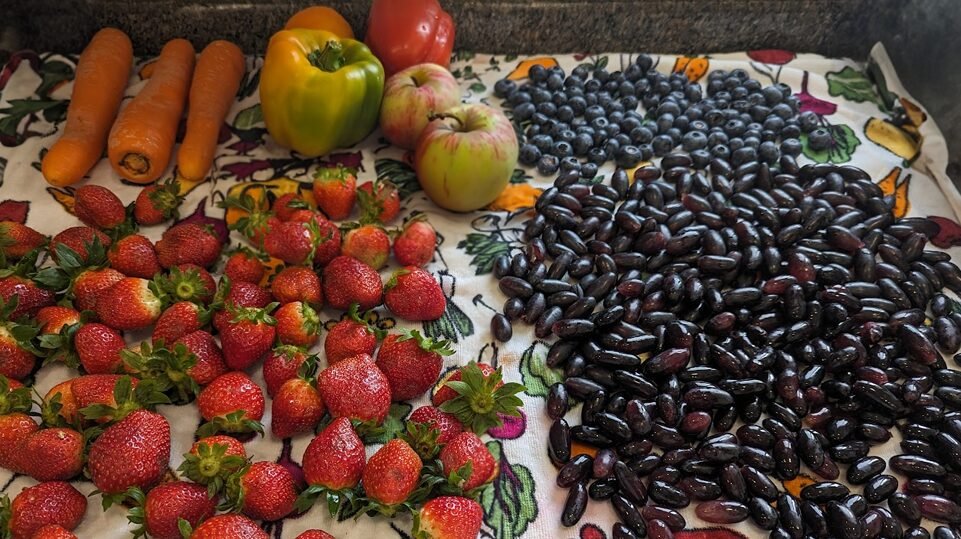The Best Way to Wash Fruits and Vegetables, Especially in a Foreign Country
Introduction
When it comes to consuming fruits and vegetables, we all know they are essential for a healthy diet. But have you ever wondered if you’re washing them properly, especially when you’re living in a foreign country?
With various suggestions floating around, from using bleach to turmeric, it can be confusing to determine the best method. In this article, we will explore the most effective and safe ways to wash your fruits and vegetables, ensuring they are clean, ready to eat, and will keep you and your family safe.
Busting the Myths: Safe Practices for Expats
If I am being honest, when we lived in the US, I never washed my fruits and veggies. Like flossing, I know I should do it – but I could just never be bothered to do it. But, the moment we moved abroad, everything changed.
We know that living abroad can be an enriching experience, but it often comes with adjustments to daily routines, including ensuring the safety of your food. Washing fruits and vegetables is crucial, but navigating unfamiliar water sources can add an extra layer of complexity.
Let’s explore some common misconceptions and embrace safe practices for washing produce when tap water quality is uncertain (and decided to write this article).
Myth #1: Bleach is a Safe and Effective Disinfectant
In a recent discussion with our diplomatic doctor, he stressed the importance of disinfecting our fruits with bleach. He said, “I would never trust anything but bleach.” My internal alarms went off and I turned to the internet to do my research.
The US Center for Disease Control (CDC) specifically states that you should NOT use bleach to wash your fruits and veggies.
On hard surfaces like floors and counter tops, bleach and disinfectants are great for killing germs that cause foodborne illness or COVID-19. These chemicals, however, can make you sick if you swallow them.
US Center for Disease Control (CDC) – Source: https://www.foodsafety.gov/blog/safe-ways-handle-and-clean-produce
While readily available and tempting for its perceived disinfecting power, bleach is not recommended for washing fruits and vegetables. Bleach is a harsh chemical that can leave harmful residues on produce, potentially causing irritation or even poisoning if ingested.
Myth #2: Pre-Made Vegetable Washes are the Answer
Strolling through our neighborhood store, the pre-made Veg Wash stood out as an ideal option to help me solve this problem.
While Pre-made vegetable washes are often marketed as a convenient solution, but they have limitations. While some may contain mild disinfectants, their effectiveness against bacteria and pesticides is generally limited.
Additionally, some brands may contain harsh chemicals that can irritate the skin or leave residues on your food. If you choose to go with this option, make sure to read the label and do your research.
Myth #3: Turmeric and Baking Soda are Natural Wonders
Our Indian cook swears by a mix of turmeric and baking soda to disinfect her fruits and veggies. While this seems like an ideal healthy and organic way – again my BS detector went off.
While these have various household uses, scientific evidence specifically supporting their effectiveness against bacteria and pesticides on produce is limited. Additionally, using them can be messy and time-consuming compared to simpler methods.
Myth #4: Vinegar is a Magic Bullet for Washing Produce
While vinegar is a common household item with various cleaning properties, scientific evidence specifically supporting its effectiveness against bacteria and pesticides on produce is limited.
Some studies have shown that vinegar solutions may reduce bacterial counts on certain fruits and vegetables, but the results haven’t been conclusive or consistent across different types of produce and bacteria strains. Additionally, the vinegar concentration and soaking time can significantly impact the effectiveness, and using excessive amounts can alter the taste of your produce.
Therefore, relying solely on vinegar for washing fruits and vegetables is not recommended as a safe or reliable practice. It’s best to stick to the established and more effective methods mentioned above to ensure the safety and hygiene of your produce.
Safe and Effective Washing Methods for Expats: Ensuring Crisp, Clean Produce, Wherever You Are
Washing fruits and vegetables is an essential step to remove dirt, bacteria, and pesticide residue, promoting safe and healthy eating. While living abroad can introduce new challenges, like concerns about tap water quality, expats can still embrace simple and effective methods to keep their produce clean.
The Power of Plain Water
The most effective and widely recommended method for washing fruits and vegetables is using clean, running water.
The World Health Organization emphasizes the crucial role of safe and clean water in preventing foodborne illnesses. This applies not only to drinking water but also to water used for washing food, including fruits and vegetables.

Here’s the simple process:
- Rinse thoroughly: Wash each piece of produce individually under cold running water for 1-2 minutes. This helps remove loose dirt, debris, and some surface bacteria.
- Gently rub: For fruits and vegetables with a firmer skin, like melons, potatoes, or cucumbers, use a clean, soft-bristled brush to gently scrub the surface. This helps remove dirt and bacteria lodged in crevices or rinds.
- Pay attention to details: For leafy greens, separate the leaves and rinse them individually, paying close attention to the base and any areas with dirt or imperfections.
- Dry completely: Use a clean paper towel or clean dishcloth to pat dry each piece of produce. Moisture can encourage bacterial growth, so thorough drying is crucial.
Additional Tips for Safe Produce Handling
- Always wash your hands with soap and warm water before handling any fruits or vegetables.
- Remove and discard the outer leaves of leafy greens, as they may harbor more dirt and bacteria.
- Cut away any bruised or damaged areas before washing and consuming your produce.
- Consider using a colander or salad spinner, especially for leafy greens, to help remove excess water and promote faster drying.
Addressing Tap Water Concerns
Let’s face it, living abroad means your water supply may not be up to your typical standards. While clean running water is the best method, expats living in areas with uncertain tap water quality may need to take additional precautions:
- Invest in a good quality water filter: Attach a filter to your faucet or purchase a countertop filter specifically designed for drinking and washing produce.
- Use bottled water: If filters are unavailable, purchase bottled water specifically for washing fruits and vegetables. Choose reputable brands and ensure the bottles are sealed properly.
- Purify your water: Portable water purifiers or purification tablets can be used according to the manufacturer’s instructions to treat tap water before using it to wash produce.
- Soak and rinse (as a last resort): If the above options are unavailable, soak your produce in clean, treated water for 10-15 minutes. This can help remove some surface contaminants. However, remember that soaking is not as effective as using clean water throughout the washing process.
Remember: It’s always better to be safe than sorry when it comes to food safety. By following these simple and effective methods, expats can enjoy the taste and health benefits of fresh produce with confidence, no matter their location.
Conclusion
Washing fruits and vegetables is a simple yet crucial step towards healthy eating, especially when visiting or living abroad. Don’t be lazy, the consequences can cost you a few days out of commission.
By embracing the power of clean water, gentle scrubbing, and thorough drying, you can ensure your produce is crisp, clean, and safe to enjoy.
Remember, avoiding harmful chemicals and following these safe practices empowers you to make informed choices and savor the taste of fresh produce with confidence, wherever your expat journey takes you.
Start enjoying the vibrant flavors of clean, safe fruits and vegetables today!








